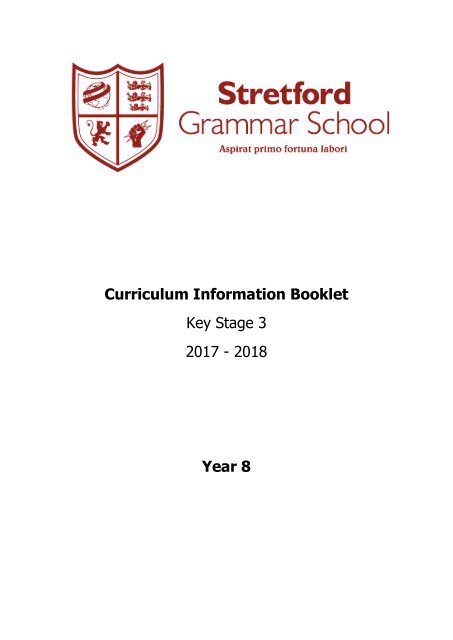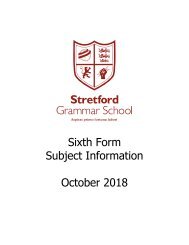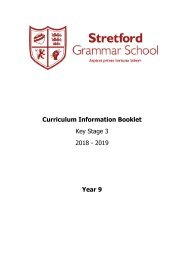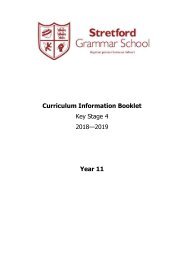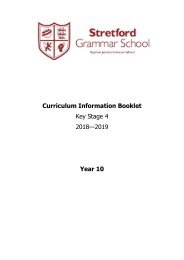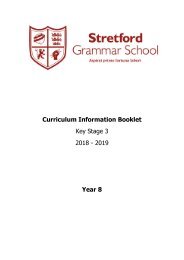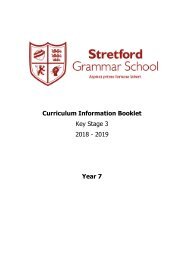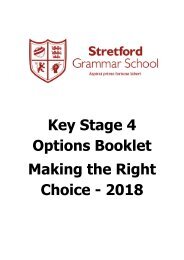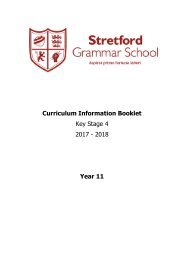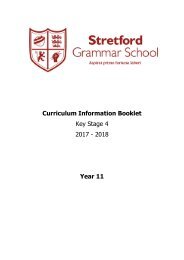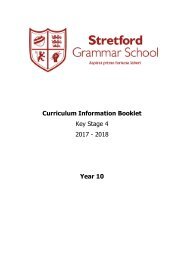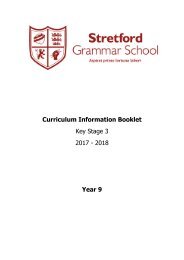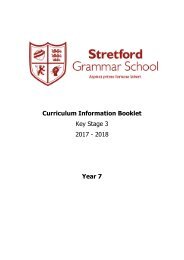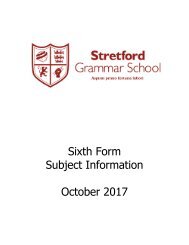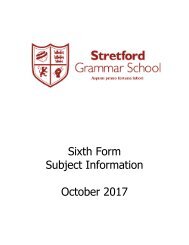OLDYear 8 Curriculum Information Booklet 2017-2018
- No tags were found...
You also want an ePaper? Increase the reach of your titles
YUMPU automatically turns print PDFs into web optimized ePapers that Google loves.
<strong>Curriculum</strong> <strong>Information</strong> <strong>Booklet</strong><br />
Key Stage 3<br />
<strong>2017</strong> - <strong>2018</strong><br />
Year 8
Vision and Values<br />
Aspirat primo fortuna labori<br />
Fortune smiles on our first effort<br />
At the heart of the school’s ethos is the ambition that every student has the<br />
opportunity to experience success. Whether in sport, enrichment or the curriculum,<br />
students will develop their self-confidence and employability through:<br />
a. A school community which is committed to development of staff and students by<br />
embracing leadership opportunities<br />
b. Making maximum progress as a result of consistently high standards of teaching<br />
and learning<br />
c. A curriculum which provides all students with the skills and knowledge to facilitate<br />
a love of lifelong learning and the motivation to realise their potential as active<br />
citizens in an ever changing world<br />
d. Facilities designed and planned to meet the needs of the school community and<br />
provide opportunities to enrich and enhance learning<br />
e. The development of an extended school, working in partnership to meet the<br />
needs of the wider community<br />
Therefore, at Stretford Grammar School we believe:<br />
<br />
<br />
<br />
<br />
<br />
<br />
In the pursuit of academic excellence<br />
In having high expectations of the progress of our students<br />
That we learn best in an environment where success in all its forms is<br />
celebrated and everyone is encouraged to take personal responsibility<br />
That this environment is created through clearly stated expectations of<br />
behaviour with emphasis on discipline and appropriate rewards<br />
That everyone needs to experience success in some aspect of school life to<br />
gain confidence and raise self esteem<br />
That we are all members of a learning community built on mutual respect and<br />
support
Calendar of Events for Year 8<br />
4 th October HPV Immunisation<br />
18 th October 7.00 pm – 9.00 pm Year 8 Welcome Evening<br />
23 rd October – 27 th October Half Term<br />
6 th December 7.00 pm Christmas Concert<br />
12 th December SEND Parent Forum<br />
22 nd December School Closes for Christmas<br />
8 th January School Reopens<br />
9 th – 14 th February Visit to Barcelona<br />
12 th – 16 th February Half Term<br />
5 th March Black Country Museum<br />
20 th March SEND Forum<br />
29 th March School Closes for Easter<br />
16 th April School Reopens<br />
26 th April Year 8 Maths Challenge<br />
2 nd May 7.00 pm Spring Concert<br />
28 th May – 1 st June Half Term<br />
4th – 8th June<br />
Year 8 Examination Week<br />
19 th June SEND Forum<br />
10 th July Sports Day<br />
12 th July Awards Evening<br />
Week Commencing 16 th July<br />
Active Learning Week<br />
19 th July School Closes for the Summer
Assessment and Reporting<br />
The purpose of assessment is to enable an informed judgement to be made about a<br />
student’s knowledge, understanding, skills and attitude. During your child’s academic career<br />
at Stretford Grammar School assessment is a continuous process which is integral to the<br />
teaching and learning cycle. For every subject your child will be assessed at various points<br />
throughout the year and these assessments will be used to inform you about the progress<br />
that your child is making in that subject area.<br />
During each term you will receive a data capture report that contains a working at grade<br />
(WAG), a target to improve sentence and an attitude to learning grade. The WAG indicates<br />
the current level of attainment at the point in time of the report. This grade is based on the<br />
formative assessments that take place during the year.<br />
The WAG reflects the new grading system that has been introduced at GCSE. The 1-9<br />
grading system is used through Key Stage 3 and Key Stage 4. Each grade reflects a set of<br />
skills and knowledge that are specified for each subject area. Below is the expected flight<br />
path of academic progression that your child will be tracked against.<br />
Year<br />
Group<br />
Progression Flight Path<br />
11<br />
10<br />
9<br />
8<br />
7<br />
Grade 1 2 3 4 5 6 7 8 9<br />
Old Grade G F E D C B A A* A* +<br />
The Working At Grade will reflect whether a student is making progress at a level that is at<br />
the top of a grade skill descriptors (+), making the expected progress within the grade skill<br />
descriptors (=), or making progress that is at the beginning of the grade skill descriptors (-<br />
).
The target to improve sentences will provide your child with specific advice on how to make<br />
further progress. The attitude to learning grade reflects your child’s approach to their<br />
studies.<br />
<br />
<br />
<br />
<br />
<br />
<br />
<br />
<br />
<br />
<br />
Assessment should be based on clear, consistent criteria which are known and<br />
understood by both teachers, students and parents/carers, and are guided by<br />
national criteria and statutory requirements where appropriate.<br />
In order to achieve consistency, assessment practice should be subject to effective<br />
moderation and standardising procedures, including regular work scrutinies, learning<br />
walks and departmental Quality Assurance.<br />
A wide range of assessment techniques should be used in different contexts and for<br />
different purposes.<br />
Assessment should provide opportunities for effective differentiation to take place.<br />
Assessment should be supported by a wide range of evidence collected over a period<br />
of time which provides a fair and thorough representation of students' skills,<br />
knowledge and understanding.<br />
Students should be involved in the assessment process so that they are encouraged<br />
to take responsibility for their own learning.<br />
The assessment process should recognise achievement, not just attainment, and<br />
seek to increase students' confidence and motivation.<br />
Assessment should support individuals in identifying strengths and weaknesses,<br />
enabling future learning to be planned through targets to improve, and assisting<br />
them in decision-making.<br />
Assessment practice should be monitored regularly and systematically and<br />
assessment procedures modified if necessary as a result.<br />
The results of assessment should be systematically recorded and used to report to<br />
parents/carers on their children's attainment.
About Our <strong>Curriculum</strong><br />
All students at Stretford Grammar School follow a broad and balanced curriculum. The<br />
curriculum is designed to engage and challenge all students to thrive to achieve their full<br />
potential, both in their studies and in developing as young people equipped to live happy<br />
and fulfilling lives in modern Britain and beyond. We aim to develop confident, considerate<br />
and successful young people, who enjoy and appreciate the value of learning and<br />
citizenship, ready to make a positive contribution to their local communities and to society.<br />
Students’ social, moral, spiritual, cultural and physical development at Stretford Grammar<br />
School is essential to their development as young people. All curriculum areas contribute to<br />
this programme, alongside specialist provision within Religious Education and through the<br />
Personal, Social, Health and Citizenship Education (PSHCE) programme which focusses on<br />
the areas of sex and relationships, careers, health, democracy, the rule of law, individual<br />
liberty and mutual respect and tolerance of those with different faiths and beliefs.<br />
All students in Years 7 to 11 follow the national curriculum which is divided into<br />
<br />
<br />
Core Subjects – English, Mathematics and Science<br />
Foundation Subjects – Art, Geography, History, Computing, Modern Foreign<br />
Languages (French, Spanish), Music, PE, Religious Education, Design Technology and<br />
PSHCE<br />
The majority of subjects in Year 8 are taught in mixed ability tutor groups and students are<br />
placed into sets for English and Mathematics.
Art<br />
Art is taught to all students at Stretford Grammar School at Key Stage 3, and the National<br />
<strong>Curriculum</strong> Programme of Study for Art & Design (2014) is used as the basis for curriculum<br />
planning and delivery, as this provides the most recent detailed and applicable content.<br />
Within each Unit, there may be anything from 2-4 individual items of homework set. On<br />
submission, these will be given a mark and summative/formative comments.<br />
Once a Unit is completed, the students are given a Self-Assessment sheet in which they<br />
reflect on their work, and look forward to their future development. These are then<br />
completed by Art staff with assessment and formative comments.<br />
N.B. Apart from the Entry Level Tests in Year 7, for all Units of Art work at Key Stage 3<br />
there may be variations in the processes and outcomes involved. The reason for this can be<br />
practical, such as availability of resources and materials, but is more often because the Units<br />
themselves have been designed to be open to individual staff and students’ interpretation<br />
and experimentation. This is the nature of Art.<br />
In Year 8, the aim for the year is to develop the students’ ability to draw imaginatively and<br />
decoratively.<br />
Unit 1 – Mucha<br />
Students will study the following within this<br />
Unit:<br />
Enlargement & use of viewfinders<br />
Decorative work & Design<br />
Lettering<br />
Commercial Art<br />
Art Nouveau<br />
Possible techniques include:<br />
Coloured Inks<br />
Photoshop<br />
Collage<br />
Drawing & Painting<br />
Unit 2 – Comic Strips<br />
Students will study the following within this<br />
Unit:<br />
<br />
<br />
<br />
Comic Strip Artists & Styles<br />
Narrative; Writing & Editing a Story<br />
Roy Lichtenstein<br />
Possible techniques include:<br />
Halftones & using Ben-Day dots<br />
Drawing & Painting<br />
Collage
Unit 3 – Heraldry<br />
Students will study the following within this<br />
Unit:<br />
<br />
<br />
<br />
Heraldry – origins and development<br />
Symbols & Meaning<br />
Badges<br />
Possible techniques include:<br />
Relief using Grey Board<br />
Cutting using Craft Knives<br />
Painting<br />
Felt-Tips<br />
Spray painting using stencils<br />
Unit 4 – Inventions<br />
Students will study the following:<br />
W.Heath Robinson<br />
Illustration<br />
Perspective<br />
Possible Techniques include:<br />
Relief using Foamboard or<br />
cardboard<br />
Cutting using Craft Knives<br />
Collage & Assembly<br />
Drawing & Painting<br />
Additional <strong>Information</strong><br />
An Art Exam will take place during the year. This will take the form of a two-part practical<br />
task, including a researched drawing study homework component, and a creative design<br />
class work component.<br />
Mr. C. Lea – <strong>Curriculum</strong> Leader for Art<br />
art@stretfordgrammar.com
Computing<br />
Topic 1<br />
Students will study the following:<br />
<br />
Programming: students will create a<br />
specification for a simple computer<br />
game and write algorithms to<br />
implement their desired features.<br />
Topic 2<br />
Students will study the following:<br />
<br />
Social effects of technology:<br />
students will research and<br />
investigate how computers and<br />
related technologies impact the<br />
world in terms of ethics, the law,<br />
and the environment.<br />
Topic 3<br />
Students will study the following:<br />
<br />
Programming: Students will<br />
complete an online course in<br />
JavaScript programming, solving<br />
small problems with code and<br />
developing their logic skills<br />
Topic 4<br />
Students will study the following:<br />
<br />
Theoretical aspects of Computer<br />
Science: students will begin to learn<br />
how computer systems function,<br />
looking at storage and processing<br />
devices, networks, and software.<br />
Topic 5<br />
Students will study the following:<br />
<br />
Organising data: students will<br />
complete a project involving<br />
organising and processing data to<br />
help run an organisation or event.<br />
Additional <strong>Information</strong><br />
Students have opportunities at various points throughout the year to join clubs to build<br />
robots, program games, and develop their logical and strategic thinking skills.<br />
Mr. J. Stenhouse - <strong>Curriculum</strong> Leader for Computer Science<br />
computing@stretfordgrammar.com
Design Technology<br />
Using creativity and imagination, students are encouraged to problem solve within a variety<br />
of contexts and practical skill based areas. They will work with different materials including<br />
woods, plastics and card, acquiring a broad range of subject knowledge and draw on<br />
disciplines such as mathematics, science, engineering, computing and art. In Year 8 and<br />
across Key Stage 3, students will also study Food and Nutrition, where they will be taught<br />
how to cook a variety of different dishes and apply the principles of nutrition and healthy<br />
eating.<br />
Rotation 1 – Materials and<br />
Make: Wood and Plastic<br />
Assessment Points:<br />
A02 – Make<br />
Students will practise and develop skills in wood joining<br />
and plastic forming to create a passive amp for their<br />
mobile phone. Studying the work of Designer Paul<br />
Cocksedge, they use an old vinyl record for the cone<br />
and make a small wooden stand using more traditional<br />
cutting and shaping hand techniques. Topics and skills<br />
covered are:<br />
A03 – Evaluate<br />
<br />
<br />
<br />
<br />
<br />
<br />
<br />
6 Rs<br />
Card Modelling<br />
Marking out and measuring<br />
Use of hand tools for cutting and shaping wood<br />
Wood joining methods<br />
Heat forming and shaping plastic<br />
Product analysis, evaluation and testing<br />
Rotation 2 – Design and<br />
Innovation: Design for the<br />
future<br />
Assessment Points:<br />
A01 - Design<br />
Students are encouraged to consider the different<br />
influences and the impact society has on the design<br />
process, exploring how and why different products<br />
have evolved over time, and where they might lead us<br />
in the future. Students will design a communications<br />
device for the future, using a range of hand drawing<br />
and modelling skills along with some 3D CAD<br />
development. Topics and skills covered are:<br />
<br />
<br />
<br />
<br />
<br />
Product Analysis<br />
Technology Push and Market Pull<br />
Ergonomics and Anthropometrics<br />
Drawing and card modelling skills<br />
CAD<br />
Rotation 3 – Food<br />
Preparation and Nutrition:<br />
Students will build on knowledge and skills in health<br />
and hygiene, food preparation and cooking, through
Multicultural Foods<br />
Assessment Points:<br />
A02 – Make<br />
planning and preparing a range of traditional dishes<br />
linking to different countries around the world. They<br />
will complete 3 practical sessions over the 9 week<br />
rotation, the final one being directed by the students<br />
around a given design brief. Topics and skills covered<br />
are:<br />
A03 – Evaluate<br />
<br />
<br />
<br />
<br />
<br />
<br />
<br />
<br />
Kitchen health and hygiene<br />
Staple foods and cultural links<br />
Cutting skills<br />
Spring Rolls practical<br />
Pineapple upside down cake practical<br />
Dough skills and function of ingredients<br />
Independent dough practical<br />
Evaluation and sensory analysis<br />
Rotation 4 – STEM:<br />
Structures and Mechanisms<br />
Assessment Points:<br />
A01 - Design<br />
Students work in small groups to problem solve in a<br />
real life context. The challenge involves applying skills<br />
in Science. Technology, Engineering and Maths to<br />
design and build a structure with pulley mechanism,<br />
which will then be put to the test as part of a class<br />
competition.<br />
Students will have to design and build the structure out<br />
of modelling materials, considering forces, materials,<br />
levers, pulleys and mechanisms.<br />
Additional <strong>Information</strong><br />
There will be a small cost to some rotation areas over the year in order to support the<br />
department to provide practical materials for design and make based projects.<br />
Parents/Carers will be always be fully informed in advance and in writing by the department<br />
and support is available for any students with financial concerns.<br />
Mrs. H. Barry – <strong>Curriculum</strong> Leader for Design Technology<br />
design@stretfordgrammar.com
English<br />
English is taught to all students in Year 8. Most classes will have a dedicated teacher,<br />
although some classes are shared. Students follow the same curriculum at the same time,<br />
regardless of which class they are in. Much of the work in Year 8 centres on the study of<br />
texts from the past, including whole fiction texts as well as a number of shorter non-fiction<br />
texts. Writing from the 19 th century features extensively throughout the year, as does the<br />
study of the importance of context.<br />
Unit 1 – The Giver and Utopian /<br />
Dystopian Literature<br />
Students will complete a class reading of<br />
The Giver by Lois Lowry as well as brief<br />
extracts from other modern dystopian and<br />
utopian fiction. They will practise and<br />
develop the following skills:<br />
<br />
<br />
<br />
<br />
Understanding the messages and<br />
themes of texts<br />
Developing an understanding of<br />
how authors create a sense of<br />
character, time, place and<br />
atmosphere<br />
Writing about how writers use<br />
language to create effects<br />
Comparing language within and<br />
across texts<br />
Assessment: Comparative analysis of two<br />
extracts of text<br />
Unit 2 – War Literature<br />
Students will read a range of war poetry<br />
from the 19 th -21 st centuries and will<br />
combine class-study with their knowledge<br />
of the genre developed during their private<br />
reading of Michael Morpurgo’s Private<br />
Peaceful in term 1. They will practise and<br />
develop the following skills:<br />
<br />
<br />
<br />
<br />
Writing from a particular point of<br />
view<br />
Exploring what fiction can teach us<br />
about conflict<br />
Appreciation of authorial technique<br />
in poetry, fiction and non-fiction<br />
An understanding of rhetorical<br />
device and technique
Assessment: Writing to express a point of<br />
view<br />
Unit 3 – Child Labour<br />
Students will read a number of extracts of<br />
fiction and literary non-fiction, spanning the<br />
18 th -21 st centuries and including work from<br />
novels, poetry and newspapers by Charles<br />
Dickens, Charles Kingsley and William<br />
Blake. They will practise and develop the<br />
following skills:<br />
<br />
<br />
<br />
Exploring the importance of context<br />
and connections between the past<br />
and the present<br />
Investigating how literature can be<br />
used to present a moral and ethical<br />
argument<br />
Using language persuasively and<br />
imaginatively<br />
Assessment: Writing imaginatively to create<br />
a sense of time and place<br />
Unit 4 – Shakespeare Pick’n’Mix<br />
Students will study extracts from a wide<br />
range of Shakespeare plays, including The<br />
Tempest, Romeo and Juliet, Macbeth and<br />
Julius Caesar. They will practise and<br />
develop the following skills:<br />
<br />
<br />
<br />
Engaging with Shakespeare’s<br />
diversity, skill and influence<br />
Writing analytically about<br />
Shakespeare’s language<br />
Interpretation through performance<br />
and analysis of Shakespeare’s work<br />
Assessment: Analysis of Shakespeare’s<br />
language in Julius Caesar<br />
Unit 5 – Watching the Detectives<br />
Students read at least one complete<br />
Sherlock Holmes story and extracts from<br />
others. They will explore features of the<br />
genre and the wider influence of these.<br />
They will practise and develop the following<br />
skills:<br />
<br />
<br />
A consolidation of their<br />
understanding of context (especially<br />
the Victorian period)<br />
The skills required to create and
analyse character and setting<br />
The language of 19 th century texts<br />
Assessment: There will be a Year 8 exam at<br />
the end of this unit, which will assess<br />
reading and writing skills<br />
Unit 6 – Blake and the Romantics<br />
Students are introduced to the context of<br />
the Romantic period in English Literature<br />
and will read poems by Blake, Wordsworth,<br />
Shelley, Keats, Coleridge and Byron. They<br />
will practise and develop the following<br />
skills:<br />
<br />
<br />
<br />
Engaging with poetry at an<br />
academic level of study, including<br />
analysis of language, structure and<br />
style of both ‘prepared’ and ‘unseen’<br />
poems<br />
Understanding the impact of a<br />
poetic movement and its sphere of<br />
influence<br />
Developing creativity and poetic skill<br />
as a writer<br />
Assessment: There is no formal assessment<br />
of this scheme, but students will prepare<br />
analytical and creative pieces as part of the<br />
scheme of work<br />
Additional <strong>Information</strong><br />
Students will be given a novel for private reading in the first term of Year 8. There will be<br />
independent homework tasks allocated on a weekly basis to monitor and assess the<br />
progress of this reading.<br />
Independent reading of fiction, non-fiction, newspapers and magazines, as well as watching<br />
documentaries and listening to talk radio are all activities to be widely encouraged in young<br />
students of English.<br />
Ms L. Yeomans – <strong>Curriculum</strong> Leader for English<br />
english@stretfordgrammar.com
Geography<br />
Geography is taught to all students at Stretford Grammar School and involves the study of a<br />
range of Physical and Human Geography topics. There is a focus on the specific countries of<br />
China and India, as well as an in depth look at a broad range of Physical and Human<br />
Geography topics. Students will also develop a range of literacy and numeracy skills<br />
including extended writing and graphical techniques. Lessons will be a mixture of discussion,<br />
independent work, enquiry and ICT skills.<br />
Unit 1 - The Rise of China<br />
Students will study the following:<br />
<br />
<br />
<br />
<br />
<br />
Facts and perceptions of China<br />
Physical and Human Geography<br />
Assessment: Why has China<br />
abandoned the One Child Policy?<br />
The Three Gorges Dam<br />
How has China changed since<br />
Tiananmen Square?<br />
Unit 2 – Extreme Weather and Climate<br />
Students will study the following:<br />
<br />
<br />
<br />
<br />
<br />
<br />
<br />
<br />
The difference between weather<br />
and climate<br />
Reading weather maps<br />
Tornadoes in the USA<br />
Dust storms in the Middle East<br />
The coldest town in the world:<br />
Oymyakon, Russia<br />
The wettest place in the world:<br />
Khasi Hills India<br />
The hottest place in the world: The<br />
Danakil Depression, Ethiopia<br />
Fieldwork assessment: Where is the<br />
best site in the school for a<br />
renewable energy project?<br />
Unit 3 – Megacities<br />
Students will study the following:<br />
<br />
<br />
<br />
<br />
<br />
Causes of urbanisation<br />
Problems found in megacities<br />
Life in favelas<br />
Improving the slums<br />
Design your own sustainable<br />
community
Unit 4 – Incredible India<br />
Students will study the following:<br />
<br />
<br />
<br />
<br />
<br />
Physical and Human Geography of<br />
India<br />
Growing India<br />
Industrious India<br />
The Thar Desert and water<br />
management<br />
Tourism and ecotourism<br />
Unit 5 – How does glaciation change<br />
the world?<br />
Students will study the following:<br />
Types of cold environments<br />
Processes by which glaciers can<br />
shape the landscape<br />
Glaciation and OS maps<br />
Life in extreme environments: The<br />
Karakoram Mountains, Pakistan<br />
Our changing climate<br />
Greenland and Icebergs<br />
The Arctic under threat<br />
Additional <strong>Information</strong><br />
The end of year exam will cover topics that have been studied over the course of the year<br />
and will be a mixture of multiple choice, short answer questions and extended responses.<br />
As part of our megacities unit, we will work with some students from a local university to<br />
redesign our local communities in a more sustainable way.<br />
Students undertake fieldwork in the school grounds to collect data to investigate<br />
Microclimate.<br />
Miss E. Eeles<br />
geography@stretfordgrammar.com
History<br />
The principal aim of the History and Politics Department is to encourage interest in, and<br />
enjoyment of, the past and to understand how it impacts on the present and the future.<br />
Students should be inspired and stimulated by the teaching they receive and they will be<br />
encouraged to widen their historical knowledge and develop skills which will serve them not<br />
only in History and Politics but in other subject areas.<br />
The Department believes that students should be encouraged to think for themselves and<br />
become inquisitive and critical citizens of the future. Students explore relevant questions<br />
which will show the importance of the past.<br />
Unit 1: England towards Industry and<br />
Empire<br />
<br />
<br />
Who were the English?<br />
What were the main changes<br />
from Tudor to Stuarts?<br />
Students will study the following:<br />
Did life get better for the people of<br />
England by 1745?<br />
Why were some immigrants treated<br />
differently from others?<br />
How integrated were Africans in the<br />
16 th and 17 th century?<br />
How do historians understand and<br />
know about the past: What<br />
evidence do we have?<br />
Unit 2: Parliament and Empire<br />
Students will study the following:<br />
The death of a King – How<br />
significant was Charles’ execution?<br />
How far did the relationship with<br />
the Crown and Parliament change<br />
by 1900?<br />
How United was the UK in 1745?<br />
Why did the Empire grow?<br />
Was the Empire all bad?<br />
Unit 3: Industrial Britain<br />
Students will study the following:<br />
Why was the UK the first Industrial<br />
Nation?<br />
Did Industrialisation have a positive<br />
impact on lives?<br />
What was it like to live in Industrial<br />
Manchester?<br />
Who migrated to Industrial England<br />
and why did they come?<br />
How were migrants treated: Asian,<br />
Black, Italian, Germans, Jews,
Scottish and Irish?<br />
Unit 4: Slavery<br />
Students will study the following:<br />
What is Slavery and how did it work<br />
in the 17 th and 18 th Century?<br />
What were the different<br />
experiences of Slaves?<br />
How and why did some people<br />
defend the Slave Trade?<br />
How and why was the Slave trade<br />
abolished?<br />
How were Black people treated in<br />
Britain during the time of the Slave<br />
trade?<br />
Unit 5: What is Democracy?<br />
Students will study the following:<br />
Why is the vote so important?<br />
Why did people protest during the<br />
Peterloo massacre?<br />
How successful were the Chartists?<br />
How and why did the attitudes to<br />
the Suffragettes change?<br />
Additional <strong>Information</strong><br />
Opportunities are available to take part in debate club on Fridays.<br />
Homework support is also available at lunch times and after school.<br />
An Educational visit to Manchester is also planned for all students to support their field study<br />
in History as well as a trip to the Black Country Museum and Maritime Museum to support<br />
their studies.<br />
Ms H. Conlin – <strong>Curriculum</strong> Leader for History and Politics<br />
history@stretfordgrammar.com
Mathematics<br />
Maths is taught to all students at Stretford Grammar School, following the National<br />
<strong>Curriculum</strong> for Mathematics. Students are placed into sets from the start of Year 8 at one of<br />
three levels: Accelerated, Challenge (parallel sets) and Support. The main content of the<br />
topics covered is the same for all sets.<br />
Unit 1 – Algebra<br />
Students will study the following:<br />
Forming sequences and finding rules<br />
Understanding and generating a<br />
non-linear sequence<br />
Functions and find composite<br />
functions and inverses<br />
Unit 2 – Number<br />
Students will study the following:<br />
Solving problems involving a mixture<br />
of operations and types of number.<br />
Effective use of a scientific<br />
calculator<br />
Unit 3 – Shape<br />
Students will study the following:<br />
Circumference and area of circles;<br />
arc length and the area of a sector<br />
Volume and surface area of more<br />
complex 3D shapes<br />
Unit 4 – Number<br />
Unit 5 – Data<br />
Unit 6 – Algebra<br />
Students will study the following:<br />
Calculations and solving problems<br />
involving fractions, percentages and<br />
ratios<br />
Students will study the following:<br />
Collect and process discrete data<br />
Select and calculate appropriate<br />
measures of average and spread<br />
Draw and interpret appropriate<br />
statistical diagrams<br />
Students will study the following:<br />
Using and manipulating expressions<br />
involving products and indices,<br />
including expansion and<br />
factorisation
Unit 7 – Number<br />
Students will study the following:<br />
Rounding and estimating<br />
calculations<br />
Standard form<br />
Unit 8 – Algebra<br />
Unit 9 – Shape<br />
Students will study the following:<br />
Form and solve more complicated<br />
linear equations<br />
Students will study the following:<br />
Properties of angles in polygons<br />
Understanding and using bearings<br />
to describe direction<br />
Pythagoras’ theorem<br />
Unit 10 – Algebra<br />
Students will study the following:<br />
Understand and draw a linear graph<br />
from its equation<br />
Calculate gradients and find the<br />
equation of a line<br />
Draw and interpret graphs in real<br />
life contexts<br />
Find and understand the gradient of<br />
a graph<br />
Unit 10 – Data<br />
Unit 12 – Probability<br />
Students will study the following:<br />
Collect and process continuous data<br />
Select and calculate appropriate<br />
measures of average and spread<br />
Draw and interpret appropriate<br />
statistical diagrams<br />
Students will study the following:<br />
Probabilities of mutually-exclusive<br />
events<br />
Draw and use a sample space<br />
diagram<br />
Use relative frequency to estimate<br />
experimental probability<br />
Unit 13 – Algebra<br />
Students will study the following:<br />
Use non-algebraic methods to solve<br />
equations<br />
Solve simple linear inequalities
Unit 14 - Shape<br />
Unit 15 – Number<br />
Students will study the following:<br />
Combining transformations<br />
Enlarge a shape<br />
Students will study the following:<br />
Solve problems involving ratio and<br />
direct and inverse proportion<br />
Unit 16 – Shape<br />
Students will study the following:<br />
Construction of bisectors of lines<br />
and angles<br />
Construction of perpendicular lines<br />
The locus of a point<br />
Solve problems involving scale<br />
drawing and constructions<br />
Additional <strong>Information</strong><br />
Students in the Accelerated set have the opportunity to participate in the UK Junior Maths<br />
Challenge.<br />
Mr. C.J. McAvoy – <strong>Curriculum</strong> Leader for Mathematics<br />
maths@stretfordgrammar.com
Modern Foreign Languages – French<br />
French is taught to half the year group at Stretford Grammar School and in Year 8 students<br />
follow the scheme of work set in the Studio 2 digital resource. Year 8 is the perfect time to<br />
inspire language learning to build a strong springboard for their future learning of French.<br />
Unit 1 –T’es branché(e)?<br />
Students will learn how to talk about their<br />
free time:<br />
<br />
<br />
<br />
<br />
<br />
La télé. Television.<br />
J’ai une passion pour le cinèma. I have<br />
a passion for the cinema.<br />
La lecture. Reading.<br />
Que fais- tu quand tu es connecté(e)?<br />
What do you do when you are online?<br />
Qu’est-ce que tu as fait hier soir? What<br />
did you do last night?<br />
Unit 2 - Paris, je t’adore! (Paris, I love<br />
you!)<br />
Students will learn all about the French<br />
capital and to be able to talk about it in<br />
French:<br />
<br />
<br />
<br />
<br />
<br />
<br />
Une semaine à Paris. A week in Paris.<br />
Mon album photo. My phot album.<br />
C’était comment, les catacombes? How was<br />
it? The catacombs?<br />
24 hueres chrono! 24 hour clock.<br />
Qui a vole la Joconde? Who has stolen the<br />
Mona Lisa?<br />
Présent ou passé? Present (tense) or past?<br />
Unit 3 – Mon identité (My identity)<br />
Students will learn to talk about their<br />
identity:<br />
<br />
<br />
<br />
<br />
<br />
<br />
Mon caractère. My character.<br />
On se dit tout. Let’s talk about everything.<br />
Quelle musique écoutes- tu? What type of<br />
music do you listen to?<br />
Mon style. My style.<br />
De quoi es- tu fan? Of what are you a fan?<br />
L’identité régionale. Regional identity.
Unit 4 – Chez moi, chez toi. (At my<br />
house, at your’s)<br />
Students will learn to talk about where they<br />
live in French:<br />
Là oú j’habite. Where I live.<br />
Dans mon appart’. In my apartment.<br />
À table, tout le monde! Everyone to the<br />
table!<br />
Il faut faire des crêpes! We must make<br />
crepes!<br />
On est allés au carnval. We went to the<br />
carnival.<br />
Unit 5 – Quel talent? (What talent?)<br />
Students will learn to talk about their<br />
talents:<br />
La France a du talent! France has some<br />
talent!<br />
Je dois gagner! I must win!<br />
Ne fais pas ça! Don’t do that!<br />
C’est qui le meillieur? Who is the best?<br />
Et le gagnant est. . . And the winner is. . .<br />
Tout sur Nouvelle Star! All about (French)<br />
X-Factor).<br />
Additional <strong>Information</strong><br />
Students will learn about the culture from a variety of different Francophone countries. They<br />
will have a strong grammatical understanding and they will always be encouraged to use<br />
French spontaneously in the classroom.<br />
There will be a number of extra- curricular trips available to the following places in <strong>2017</strong> –<br />
<strong>2018</strong>:<br />
1. Festive Fun in France!<br />
2. ¡Viva Barça!<br />
3. Discover more in Brittany.<br />
Miss C. Ashall – <strong>Curriculum</strong> leader for Modern Foreign Languages<br />
mfl@stretfordgrammar.co
Modern Foreign Languages – Spanish<br />
Spanish is taught to half the year group at Stretford Grammar School and in Year 8 students<br />
follow the scheme of work set in the ¡Viva! 2 digital resource. Year 8 is the perfect time to<br />
inspire language learning to build a strong springboard for their future learning of Spanish.<br />
Unit 1 – Mis vacaciones (My Holidays)<br />
Students will learn how to talk about the<br />
following aspects of their holidays:<br />
<br />
<br />
<br />
<br />
<br />
De vacaciones. On Holiday<br />
¿Qué hiciste? What did you do?<br />
El ultimo día. The last day<br />
¿Cómo te fue? How was it?<br />
El verano pasado. Last summer.<br />
Unit 2 –Todo sobre m vida (All about<br />
my life)<br />
Students will learn to talk about their lives<br />
in Spanish:<br />
<br />
<br />
<br />
<br />
<br />
<br />
Mi vida, mi móvil. My life, my mobile.<br />
¿Qué tipo de música te gusta? What type of<br />
music do you like?<br />
Me gustan las comedias. I like comedies.<br />
¿Qué hiciste ayer? What did you do<br />
yesterday?<br />
Mi guía. My (TV) guide.<br />
Mi talento. My talent (Talent Show!)<br />
Unit 3 – ¡A comer! (Let’s eat!)<br />
Students will learn to talk about food:<br />
<br />
<br />
<br />
<br />
<br />
<br />
<br />
¿Qué te gusta comer? What do you like to<br />
eat?<br />
¿Qué desayunas? What do you have for<br />
breakfast?<br />
En el restaurant. In the restaurant.<br />
¿Qué vamos a comprar? What are we going<br />
to buy?<br />
¡Fiesta! Pary!<br />
¿Y tú? ¿Qué opinas? And you? What do you<br />
think? – strategies for spontaneous talk<br />
¡Cocinamos! Let’s cook!
Unit 4 – ¿Qué hacemos? (What shall<br />
we do? )<br />
Students will learn to make arrangements<br />
for going out in Spanish.<br />
<br />
<br />
<br />
<br />
<br />
<br />
<br />
¿Te gustaría ir al cine? Would you like to go<br />
to the cinema?<br />
Lo siento, no puedo. I’m sorry, I can’t<br />
¿Cómo te preparas? How do you get ready?<br />
(To go out.)<br />
¿Qué vas a llevar? What are you going to<br />
wear?<br />
Hoy, partido! Today, match! (sports match).<br />
El baile de disfraces. Fancy dress dance.<br />
Desfile de moda. Fashion show.<br />
Unit 5- Operación verano. (Operation<br />
summer).<br />
Students will learn to talk the summer and<br />
to use useful vocabulary when in a Hispanic<br />
country.<br />
¿Qué casa prefieres? Which house do you<br />
prefer?<br />
¿Qué se puede hacer en . , . ? What can<br />
you do in . . . ?<br />
¿Dónde está . . .? Where is.. .?<br />
Campamentos de verano. Summer camp.<br />
¡Destinos! Destinations!<br />
Visita mi ciudad. Visit my town.<br />
Additional <strong>Information</strong><br />
Students will learn about the culture from a variety of different Hispanic countries. They will<br />
have a strong grammatical understanding and they will always be encouraged to use<br />
Spanish spontaneously in the classroom.<br />
There will be a number of extra- curricular trips available to the following places in <strong>2017</strong> –<br />
<strong>2018</strong>:<br />
1. Festive Fun in France!<br />
2. ¡Viva Barça!<br />
3. Discover more in Brittany.<br />
Miss C. Ashall – curriculum leader for Modern Foreign Languages<br />
mfl@stretfordgrammar.com
Music<br />
Music is taught to all students at Stretford Grammar School and the aim is to ensure all<br />
students can read Musical notation of various forms, compose and perform in different<br />
styles and be able to identify key features of different Musical Genres by the end of Year 9<br />
in order to prepare them for Key Stage 4. Lessons are mainly practical with an opportunity<br />
to work alone, in pairs and in larger groups for half termly assessments. Some lessons will<br />
include some written, listening and brief analysis and written work. There is always a wide<br />
variety of extension tasks for those students who arrive at School and can already play an<br />
instrument and read Music so they have the same level of challenge as someone in the class<br />
who is new to the subject.<br />
Unit 1 -Structure in Music<br />
Students will study the following:<br />
Baseline assessment to find out<br />
prior knowledge which includes<br />
written, listening and practical<br />
activities.<br />
Different musical structures and<br />
how ideas can be re-used.<br />
How contrast is used to create<br />
variety.<br />
Listening tasks to identify changes /<br />
contrasts in Music<br />
Performance and composition work<br />
using given Musical structures.<br />
Assessment and evaluation of the<br />
work completed<br />
Unit 2 – Ostinato, Canon and<br />
Sequence<br />
<br />
<br />
<br />
<br />
<br />
Students will study the following:<br />
Different compositional devices to<br />
help with composition work.<br />
Melodic and rhythmic ostinato<br />
patterns.<br />
Listening to and understanding how<br />
Leitmotifs are constructed.<br />
Composing leitmotifs for Good and<br />
Evil characters and performing them<br />
to the class.<br />
Understanding how sequences work<br />
and a brief insight into Baroque<br />
Music
Unit 3 – Sounds and Textures<br />
Students will study the following:<br />
Musical intervals and how tones /<br />
semitones are used to create effect.<br />
Composing using consonance and<br />
dissonance.<br />
Performing using Parallel motion in<br />
pairs for peer assessment.<br />
Compositions based on Parallel<br />
Motion using a given structure.<br />
Group performance<br />
Unit 4 – Performance and<br />
Composition skills<br />
<br />
<br />
<br />
<br />
<br />
<br />
Students will study the following:<br />
General Music theory and how to<br />
read Musical scores<br />
Performing using single finger<br />
chords and backing tracks as a<br />
group and a class<br />
Vocal riffs and building layers<br />
Learning to read Bass clef notation<br />
and performing with the Left hand<br />
on a keyboard<br />
Developing performing and<br />
ensemble skills<br />
Understanding how chords are<br />
constructed and be able to use them<br />
to harmonise simple melodies<br />
Unit 5 – World Music – Indian and<br />
Gamelan Music<br />
<br />
<br />
<br />
<br />
<br />
<br />
Students will study the following:<br />
The elements, instruments, notation<br />
and Musical traditions that are used<br />
in Indian Music<br />
How to improvise<br />
Compositions and performances are<br />
created using the above<br />
Brief introduction to Bhangra Music<br />
As above with Gamelan Music<br />
Gamelan Music created via an online<br />
Music technology programme<br />
Unit 6 – Chords and Blues<br />
<br />
<br />
<br />
Students will study the following:<br />
How chords are constructed<br />
Performing the Primary Chords<br />
using full finger chords and single<br />
finger chords<br />
Harmonising melodies using these<br />
chords
Introduction to Blues Music and its<br />
origins and history<br />
Performing 12 Bar Blues chord<br />
sequences and improvising over the<br />
top with the blues scale<br />
Brief introduction to lyric writing and<br />
where time permits students write a<br />
Blues song to perform<br />
Additional <strong>Information</strong><br />
Opportunities are available to have instrument lessons for 20 minutes or more with a<br />
specialist instrument teacher and all students are encouraged to get involved in at least one<br />
of the many extra-curricular clubs on offer.<br />
Mrs. K. Swales – <strong>Curriculum</strong> Leader for Music<br />
music@stretfordgrammar.com
Physical Education<br />
PE is an integral element of the curriculum and accessible to all students. Students<br />
undertake four hours of PE over the two week timetable cycle.<br />
Boys – Term 1<br />
Students will undertake the following key<br />
elements:<br />
<br />
<br />
<br />
<br />
<br />
Fitness<br />
Football<br />
Cross Country<br />
Gym<br />
Rugby Union<br />
Girls – Term 1<br />
Students will undertake the following key<br />
elements:<br />
<br />
<br />
<br />
<br />
Netball<br />
Fitness<br />
Cross Country<br />
Gym<br />
Boys – Term 2<br />
Students will study the following key<br />
elements:<br />
<br />
<br />
<br />
<br />
Rugby Union<br />
Rugby League<br />
Basketball<br />
Hockey<br />
Girls – Term 2<br />
Students will study the following key<br />
elements:<br />
<br />
<br />
<br />
<br />
<br />
<br />
Dance<br />
Rugby<br />
Netball<br />
Football<br />
Hockey<br />
Basketball
Boys – Term 3<br />
Students will study the following key<br />
elements:<br />
<br />
<br />
<br />
<br />
Handball<br />
Athletics<br />
Tennis<br />
Cricket<br />
Girls – Term 3<br />
Students will study the following key<br />
elements:<br />
<br />
<br />
<br />
Athletics<br />
Tennis<br />
Rounders<br />
Additional <strong>Information</strong><br />
Opportunities are provided for students to undertake sports outside of the timetabled<br />
curriculum.<br />
Mr. S. Hodgson – <strong>Curriculum</strong> Leader for PE<br />
sport@stretfordgrammar.com
PSHCE<br />
PSHCE lessons in Year 8 address age appropriate issues and follow the non-statutory<br />
elements of the National <strong>Curriculum</strong> for PSHE, the National <strong>Curriculum</strong> for Citizenship and<br />
the statutory requirements for Sex and Relationships Education (SRE). There is a statutory<br />
right of withdrawal from the teaching of SRE which should be notified in writing to the<br />
Assistant Headteacher with responsibility for PSHCE.<br />
Unit 1 -Being Me<br />
Students will study the following:<br />
<br />
<br />
<br />
The concept and role of the family<br />
in modern society<br />
How where we live will influence the<br />
type of person we are and will<br />
become<br />
The difference between faith and<br />
belief and their role in shaping the<br />
community<br />
Unit 2 – Health Matters and Drugs<br />
Education<br />
<br />
<br />
<br />
<br />
<br />
Students will study the following:<br />
The link between choice and a<br />
healthy lifestyle<br />
The law on drugs and the effects of<br />
tobacco and its effects on health<br />
and well being<br />
The place of alcohol in the UK<br />
The link between consequence and<br />
action and how this may involve<br />
taking risks<br />
The main forms of contraception<br />
Unit 3 – Relationships<br />
Students will study the following:<br />
The manner in which relationships<br />
cause strong emotions and feelings<br />
Communication, negotiation,<br />
assertiveness and collaboration<br />
How people respond differently in<br />
the same situation and<br />
understanding this<br />
Positive and stable relationships –<br />
features and how they can support<br />
loss and bereavement<br />
Roles in society
Unit 4 – Diversity<br />
Students will study the following:<br />
<br />
<br />
<br />
<br />
<br />
Poverty – absolute and relative as<br />
seen in the UK and the world<br />
The economic and political choices<br />
available to people<br />
Rights and responsibilities and their<br />
attachment to different groups<br />
Skills of debating controversial<br />
issues<br />
The link between personal<br />
responsibility and actions<br />
Unit 5 – Your Money and Careers<br />
Students will study the following:<br />
<br />
<br />
<br />
<br />
<br />
The different types of bank account<br />
and analysing what a bank can offer<br />
The role of debt and the issues<br />
surrounding this<br />
What is a balanced bank account?<br />
How advertising affects different<br />
people in different ways<br />
The role of small businesses in the<br />
economy<br />
Unit 6 – Risk<br />
Students will study the following:<br />
<br />
<br />
<br />
<br />
<br />
Personal risk and the levels of risk<br />
and differing outcomes<br />
Why people take risks<br />
Personal motivators when making a<br />
decision<br />
Standing up for what you believe in<br />
The link between goals and risks<br />
Additional <strong>Information</strong><br />
PSHCE is an integral element of student development at Stretford Grammar School and is<br />
planned to support the work undertaken in form time and through the assembly<br />
programme. Use is also made of full days to work with specialist providers to support<br />
student learning.<br />
Mr. I. Nicholson – Assistant Headteacher<br />
pshce@stretfordgrammar.com
Religious Education<br />
RE is taught to all students at Stretford Grammar School and in Year 8 the Trafford Agreed<br />
Syllabus for Religious Education 2016 is used as the basis for curriculum planning and<br />
delivery. Parents/carers have the right of withdrawal from the teaching of some or all of RE.<br />
Unit 1 – Do we need to prove God’s<br />
existence?<br />
Students will study the following key areas<br />
with reference to Christianity, Islam,<br />
Buddhism and non-religious beliefs<br />
<br />
<br />
<br />
<br />
<br />
<br />
<br />
<br />
What isthe difference between facts,<br />
beliefs and opinions? How do we<br />
know anything at all?<br />
Why do Muslims believe in God? Do<br />
they believe God can be proved to<br />
exist?<br />
Why did the Buddha think belief in<br />
God was unimportant?<br />
In Buddhist thinking, what can save<br />
us from pain and suffering?<br />
Do Thomas Aquinas’ ‘5 Ways’ justify<br />
Christians’ belief in God? Do they<br />
prove God?<br />
Christians claim to experience God<br />
in many different ways. How can<br />
these claims be appreciated and<br />
appraised?<br />
What are the best atheist arguments<br />
against God? Can atheists prove<br />
there is no God?<br />
So, for Buddhists, Christians,<br />
Muslims and Atheists, how<br />
important is the idea of proving or<br />
disproving God?<br />
Unit 2 – Is death the end?<br />
Students will study the following key areas<br />
with reference to Christianity, Buddhism<br />
and non-religious beliefs<br />
<br />
<br />
<br />
<br />
What do people believe about life?<br />
What do people believe about an<br />
after-life?<br />
Why do we have funerals?<br />
What do Buddhist people believe
about life and death?<br />
Does death Matter to a Humanist?<br />
Is this life hell?<br />
Is death the end? Does it matter?<br />
Unit 3 – Is religion a power for peace<br />
or a cause of conflict in the world<br />
today?<br />
Students will study the following key areas<br />
with reference to Christianity, Islam and<br />
Sikhism<br />
<br />
<br />
<br />
<br />
<br />
<br />
<br />
<br />
<br />
<br />
<br />
<br />
<br />
<br />
What matters about peace, conflict<br />
and religion?<br />
What does the Sikh religion teach<br />
and do with regard to conflict and<br />
peace?<br />
What do the Sikh scriptures teach<br />
about conflict and peace?<br />
What is there for me to learn from<br />
the Sikhs about peace and conflict?<br />
The example of Bhagat Puran Singh<br />
What did the Prophet Muhammad<br />
(pbuh) achieve as a peacemaker?<br />
How have some of his followers<br />
made peace?<br />
How do Muslims respond when they<br />
are pictured as terrorists or fanatics?<br />
Why does this happen?<br />
What is jihad, and how can it be<br />
understood by non-Muslims?<br />
What is there for me to learn from<br />
the Muslims about peace and<br />
conflict?<br />
What does the Christian religion<br />
teach and do about peace and<br />
conflict?<br />
What is there for me to learn from<br />
the Christians about peace and<br />
conflict?<br />
Do religious communities intend to<br />
make peace or war? Why don’t they<br />
always put their ideals into action?<br />
What can be learned from Muslim,<br />
Christian and Sikh inspiring<br />
peacemakers?<br />
So, at the end of the unit, what has<br />
been learned? Does religion cause<br />
war? A reasonable argument!<br />
How can we summarise the<br />
viewpoints of different religions on<br />
our key question?
Unit 4 – Should religious buildings be<br />
sold to feed the starving?<br />
Students will study the following key areas<br />
with reference to Christianity, Islam,<br />
Sikhism and Hinduism<br />
<br />
<br />
<br />
<br />
<br />
<br />
<br />
What difference to charitable giving<br />
does it make if you are religious? Do<br />
religious people do more to help the<br />
starving?<br />
What difference does a Mosque<br />
make to Muslim life?<br />
What does the Sikh community do<br />
through its worship and building to<br />
combat poverty?<br />
What does it mean to ‘see Jesus in<br />
the face of the poor’? What are the<br />
deeper meanings of Christian<br />
worship?<br />
What can high achieving students or<br />
older students add to the<br />
understanding of worship?<br />
What does it mean to talk about the<br />
‘function of worship’ in the sociology<br />
of religion?<br />
What are the best arguments about<br />
whether religious buildings should<br />
be sold to feed the starving?<br />
Additional <strong>Information</strong><br />
Educational visits to see religion as a lived experience are offered during Year 8 so that<br />
students can place their learning about religion in context.<br />
Mrs. R. Lea – <strong>Curriculum</strong> Leader for Religious Education<br />
religion@stretfordgrammar.com
Science<br />
Science is taught to all students at Stretford Grammar School and the aim is to ensure that<br />
all students develop a good understanding of basic scientific concepts, start to develop their<br />
understanding of the practical applications of Science so as to be able to start to apply their<br />
knowledge to practical applications. Lessons include a balance of written work, research and<br />
project work. Practical work is used in a majority of lessons to introduce concepts or to help<br />
students visualise scientific concepts. Practical work is completed in pairs or in larger<br />
groups. Student progress is assessed via a combination of classwork, homework tasks,<br />
short topic tests and longer termly tests.<br />
Key Stage 3 Science is taught over two years and helps students to develop the knowledge<br />
and skills to help them prepare for the GCSE course.<br />
Topic 1 Heating and Cooling<br />
Students will study the following:<br />
<br />
<br />
How thermal energy affects the<br />
physical properties of a substance.<br />
The methods of heat transfer by<br />
conduction, convection and<br />
radiation.<br />
Topic 2 Atoms, Elements, Compounds<br />
and Mixtures<br />
Topic 3 Respiration and Gas exchange<br />
Students will study the following:<br />
<br />
<br />
<br />
<br />
<br />
<br />
The difference between atoms and<br />
elements<br />
The properties of metals<br />
The organisation of the Periodic<br />
table<br />
The differences between elements<br />
and compounds<br />
Chemical formulae and naming<br />
compounds<br />
Planning and evaluating<br />
investigations<br />
Students will study the following:<br />
<br />
<br />
<br />
<br />
The respiratory system<br />
Control of ventilation<br />
How the lungs are adapted for<br />
efficient gas exchange<br />
Aerobic and Anaerobic cellular<br />
respiration
Topic 4 Forces (2)<br />
Students will study the following:<br />
<br />
<br />
<br />
<br />
What is speed and how we measure<br />
and calculate it?<br />
Graphical representations of speed<br />
over time and analysing that<br />
information.<br />
An introduction into how forces<br />
affect the speed of an object<br />
What is pressure, calculating it and<br />
how it can be applied to liquids and<br />
gases<br />
Topic 5 Muscles and bones<br />
Students will study the following:<br />
<br />
<br />
The skeleton, the role of joints and<br />
muscles in movement.<br />
Investigating the effects of exercise<br />
on muscle fatigue<br />
Topic 6 The Earth<br />
Students will study the following:<br />
<br />
<br />
<br />
<br />
<br />
<br />
<br />
<br />
<br />
The composition of the atmosphere<br />
The formation and composition of<br />
rocks<br />
The factors that affect crystal size in<br />
igneous rocks<br />
How physical, chemical and<br />
biological factors affect rocks /<br />
erosion<br />
The effects of melting glaciers<br />
The formation of sedimentary rocks<br />
How fossils are formed<br />
The rock cycle<br />
Continental drift<br />
Topic 7 Light<br />
Students will study the following:<br />
<br />
<br />
<br />
<br />
The properties of light<br />
How light waves reflect and refract<br />
when they encounter different<br />
objects.<br />
An introduction into how the eye<br />
and a camera both detect and focus<br />
light<br />
The different colours of light and<br />
how this changes with filters, mixing
and reflection<br />
Topic 8 Sound<br />
Students will study the following:<br />
<br />
<br />
<br />
<br />
The properties of a mechanical<br />
waves such as sound.<br />
How loudness and pitch can be<br />
varied and how this affects the<br />
shape of the wave<br />
How humans and devices detect<br />
sound waves.<br />
Why we need to protection our ears<br />
from excessive sounds.<br />
Topic 9 Magnetism and<br />
electromagnetism<br />
Students will study the following:<br />
<br />
<br />
<br />
<br />
The properties of magnetic<br />
materials; how they interact and are<br />
made magnetic.<br />
The strength of the field around a<br />
magnet where its force is<br />
experienced<br />
How a current in a wire produces a<br />
magnetic field<br />
Use this phenomena to make simple<br />
electromagnets and motors.<br />
Topic 10 Ecosystems and<br />
Photosynthesis<br />
Students will study the following:<br />
The structure of the leaf<br />
The importance of Photosynthesis<br />
The role of Minerals in plant<br />
Chemosynthesis in bacteria and<br />
other organisms<br />
Food chains and food webs and the<br />
consequences if these are disrupted<br />
Competition and adaptation<br />
Adapting to environmental change<br />
Additional <strong>Information</strong><br />
Students have the opportunity to take part in a range of STEM related competitions and<br />
clubs organised by the department throughout the year.<br />
Mrs. G. Sutton – <strong>Curriculum</strong> Leader for Science<br />
science@stretfordgrammar.com
Homework Timetable<br />
Homework expectations over a two week timetable. Homework in Design Technology and<br />
Music will be set every two weeks.<br />
Art<br />
8S<br />
8T<br />
8R<br />
8O<br />
8E<br />
Computing<br />
8S<br />
8T<br />
8R<br />
8O<br />
8E<br />
English<br />
C (CY)<br />
D (YM/HW)<br />
H (HW)<br />
M (YM)<br />
N (NX)<br />
Q (QP)<br />
Geography<br />
8S<br />
8T<br />
8R<br />
8O<br />
8E<br />
History<br />
8S<br />
8T<br />
8R<br />
8O<br />
8E<br />
1M 1T 1W 1T 1F 2M 2T 2W 2T 2F Total<br />
40<br />
40<br />
40<br />
40<br />
40<br />
40<br />
40<br />
40<br />
40<br />
40<br />
40<br />
40<br />
40<br />
40<br />
40<br />
40<br />
40<br />
40<br />
40<br />
40<br />
40<br />
40<br />
40<br />
40<br />
40<br />
40<br />
40<br />
40<br />
40<br />
40<br />
40<br />
40<br />
40<br />
40<br />
40<br />
40<br />
40<br />
40<br />
40<br />
40<br />
40<br />
40<br />
40<br />
40<br />
40<br />
40<br />
40<br />
40<br />
40<br />
40<br />
40<br />
40<br />
80<br />
80<br />
80<br />
80<br />
80<br />
80<br />
80<br />
80<br />
80<br />
80<br />
80<br />
80<br />
80<br />
80<br />
80<br />
80
Maths<br />
U (PA/SG)<br />
V (MK)<br />
W (LF/CD)<br />
X (CT)<br />
Y (MC)<br />
Z (PA)<br />
MFL<br />
8S<br />
8T<br />
8R<br />
8O<br />
8E<br />
RE<br />
8S<br />
8T<br />
8R<br />
8O<br />
8E<br />
Science<br />
8S<br />
8T<br />
8R<br />
8O<br />
8E<br />
1M 1T 1W 1T 1F 2M 2T 2W 2T 2F<br />
40<br />
40<br />
40<br />
40<br />
40<br />
40<br />
40<br />
40<br />
40<br />
40<br />
40<br />
40<br />
40<br />
40<br />
40<br />
40<br />
40<br />
40<br />
40<br />
40<br />
40<br />
40<br />
40<br />
40<br />
40<br />
40<br />
40<br />
40<br />
40<br />
40<br />
40<br />
40<br />
40<br />
40<br />
40<br />
40<br />
40<br />
40<br />
40<br />
40<br />
40<br />
40<br />
120<br />
120<br />
120<br />
120<br />
120<br />
120<br />
80<br />
80<br />
80<br />
80<br />
80<br />
40<br />
40<br />
40<br />
40<br />
40<br />
80<br />
80<br />
80<br />
80<br />
80<br />
With minutes per homework and the relevant class or set.


